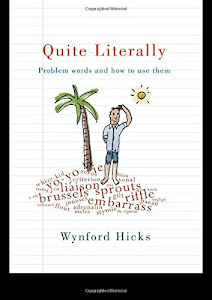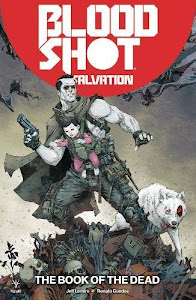
Quite Literally: Problem Words and How to use Them
Category: Christian Books & Bibles, Politics & Social Sciences
Author: Hoda Kotb
Publisher: Gabrielle Balkan
Published: 2019-10-07
Writer: Lucy Collin, Megan McDonald
Language: Welsh, Turkish, Latin
Format: Audible Audiobook, Kindle Edition
Author: Hoda Kotb
Publisher: Gabrielle Balkan
Published: 2019-10-07
Writer: Lucy Collin, Megan McDonald
Language: Welsh, Turkish, Latin
Format: Audible Audiobook, Kindle Edition
Download Quite Literally: Problem Words and How to use Them - 19 hours ago Commonly Misspelled and Confused Words (Quick Study Academic). by lezing 3 hours ago. FAQ. How to download.
Download Quite Literally: Problem Words and How to use Them - FAQ. How to download. What is File Storage. Advanced Search. All these words. This exact wording or phrase.
Quite Literally: Problem Words and How to - Google Книги - In Quite Literally, Wynford Hicks answers questions like: What's an alibi, a bete noire, a celibate, a dilemma? Should underway be two words? Is the word 'meretricious' worth using at all? How do you spell realise - with an s or a z - and should bete be bête? Should you split infinitives, end
Quite Literally: Problem Words and How to use Them - Wynford Hicks - In Quite Literally, Wynford Hicks answers questions like: What's an alibi, a bete noire, a celibate, a dilemma? Should underway be two words? Is the word 'meretricious' worth using at all? How do you spell realise - with an s or a z - and should bete be bête? Should you split infinitives, end
Quite Literally: Problem Words and How to use Them free - Quite Literally: Problem Words and How to use Them free ebook download.
Quite Literally - problem words and how to use them properly - Quite Literally - study of problematic words in the English language and how to use them properly - a book review. In this sense it's rather like Bill Bryson's Troublesome Words and Mother Tongue, Keith Waterhouse's Newspaper Style and Lynne Truss's recent Eats Shoots and Leaves.
Quite Literally - Problem Words and How to Use Them - Lingvist - How do you spell realise—with an s or a z— and should bete be bête? Should you split infinitives, end sentences with prepositions, start them with conjunctions? What about four-letter words, euphemisms, foreign words, Americanisms, clichés, slang, jargon? And does the Queen speak the Queen's English?
Quite literally : problem words and how to : Internet Archive - Quite literally : problem words and how to use them.
Quite Literally: Problem Words and How to use Them | Wynford Hicks - They make the problem of problem words worse. Take these traditional precepts of old-fashioned English teaching: don't start a sentence with a Unfortunately, in the case of words like aggravate, disinterested and fulsome, it looks as though both old and new meanings are in current use
Quite Literally: Problem words and how to use them - Learn English - In Quite literally , Wynford Hicks answers questions like these. This is a guide to English usage for readers and writers, professional and amateur, established and aspiring, formal trainees and those trying to break in; students of English, both language and literature, and their teachers.
Quite Literally: Problem Words and How to use Them | Wynford Hicks - I suspect that every reader will identify at least one 'problem word' and some readers will identify many more. Consider the difference between 'bate' (as in bated breath) and 'bait' (as in to set a trap).
Quite Literally: Problem words and how to use them / AvaxHome - In Quite literally , Wynford Hicks answers questions like these. This is a guide to English usage for readers and writers, professional and amateur It concentrates on writing rather than speech. But the advice given on how to use words in writing can usually be applied to formal speech - what
What does the phrase 'quite literally' mean? - Quora - Quite literally means in reality, actually, really. Quite literally would be used to differentiate from the figurative sense of words. Now, the hard part is don't do anything different. Continue to have the relationship as you have been evaluating how things go along the way to figure out if you both can
[PDF] Quite Literally Problem Words and How to use | Perlego - Start reading Quite Literally for free online and get access to an unlimited library of academic and non-fiction books on Perlego. In Quite Literally, Wynford Hicks answers questions like: What's an alibi, a bete noire, a celibate, a dilemma? Should underway be two words?
Quite Literally: Problem Words and How to Use Them - Title: Quite Literally: Problem Words and How to Use Them Author(s): Wynford Hicks Publisher: Routledge Date: 2004 Pages: 355 Size: 1.63 Mb Format: PDF Quality: High Language: British and American English.
Quite Literally: Problem Words and How to Use Them by - Quite Literally book. Read 2 reviews from the world's largest community for readers. This is a guide to English usage for readers and writers, Should underway be two words? Is the word 'meretricious' worth using at all? How do you spell realise - with an s or a z - and should bete be b�te?
Quite Literally: Problem Words and How to use Them - In Quite Literally , Wynford Hicks answers questions like: * What's an alibi, a bete noire, a celibate, a dilemma? * Is the word 'meretricious' worth using at all? * How do you spell realise - with an s or a z? * Should you split infinitives, end sentences with prepositions, start them with conjunctions?
Quite Literally: Problem Words and How to use - There was a problem loading your book clubs. Please try again. 'Wynford Hicks really does have a way with words ... the correct way. Whether you want to improve your writing for professional purposes or just want to know more about our native language this book provides excellent value.'
Quite Literally: Problem words and how to use them | Forum - In Quite literally , Wynford Hicks answers questions like these. This is a guide to English usage for readers and It concentrates on writing rather than speech. But the advice given on how to use words in writing can usually be applied to
Quite Literally: Problem Words and How to use Them - PDF - They make the problem of problem words worse. Take these traditional precepts of old-fashioned English teaching: don't start a sentence with a conjunction; don't end a sentence with a preposition; don't split an infinitive. These instructions derive from the grammar of Latin, which was used as
Quite Literally: Problem words and how to use them - EBOOKEE! - In Quite literally , Wynford Hicks answers questions like these. This is a guide to English usage for readers and writers, professional and amateur It concentrates on writing rather than speech. But the advice given on how to use words in writing can usually be applied to formal speech - what
Hicks Wynford. Quite Literally: Problem Words and How to Use Them - This is a guide to English usage for readers and writers, professional and amateur, established and aspiring, formal trainees and those trying to break in; students of English, both language and literature, and their teachers.
Скачать книгу Quite Literally: Problem words and how to use them - In Quite literally , Wynford Hicks answers questions like these. This is a guide to English usage for readers and writers, professional and amateur But the advice given on how to use words in writing can usually be applied to formal speech - what is carefully considered, broadcast, presented,
Quite Literally: Problem Words and How to use Them | eBay - See details and exclusions - Quite Literally by Wynford Hicks. Product Information. Concentrating on writing rather than speech, Wynford Hicks examines the usage of uncommon words, slang and constructions that challenge conventional rules of grammar.
Quite Literally: Problem Words and How to :: - In Quite Literally, Wynford Hicks answers questions like: * What's an alibi, a bete noire, a celibate, a dilemma? * Should underway be two words? * Is the word 'meretricious' worth using at all? * How do you spell realise - with an s or a z?
Hicks, Wynford - Quite literally : problem words a. - Search RSL - Quite literally : problem words a. how to use them / Wynford Hicks. - [Repr.]. - London ; New York : Routledge, 2004.
BookReader - Quite Literally: Problem Words and How to use - Quite Literally: Problem Words and How to use Them (Wynford Hicks).
Quite Literally: Problem Words and How to use Them - 1st - In Quite Literally, Wynford Hicks answers questions like: What's an alibi, a bete noire, a celibate, a dilemma? Should underway be two words? Is the word 'meretricious' worth using at all? How do you spell realise - with an s or a z - and should bete be bête? Should you split infinitives, end
[goodreads], [audible], [audiobook], [kindle], [english], [free], [read], [epub], [pdf], [online], [download]


















0 komentar:
Posting Komentar
Catatan: Hanya anggota dari blog ini yang dapat mengirim komentar.